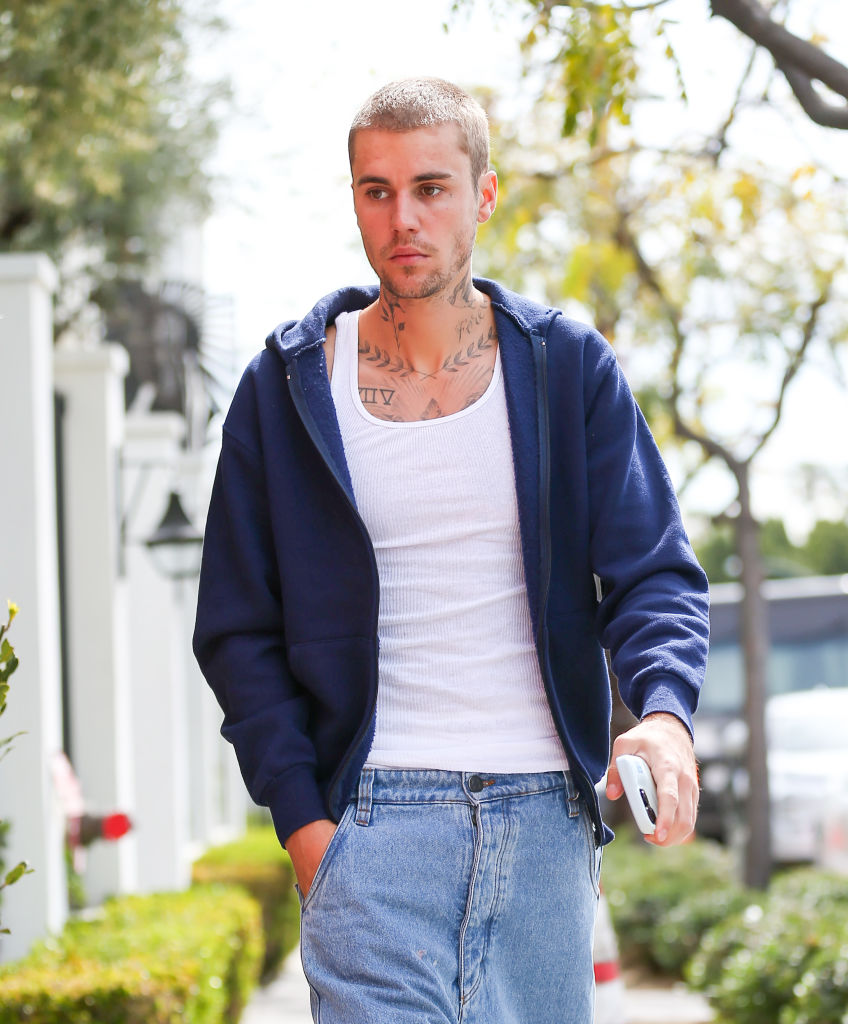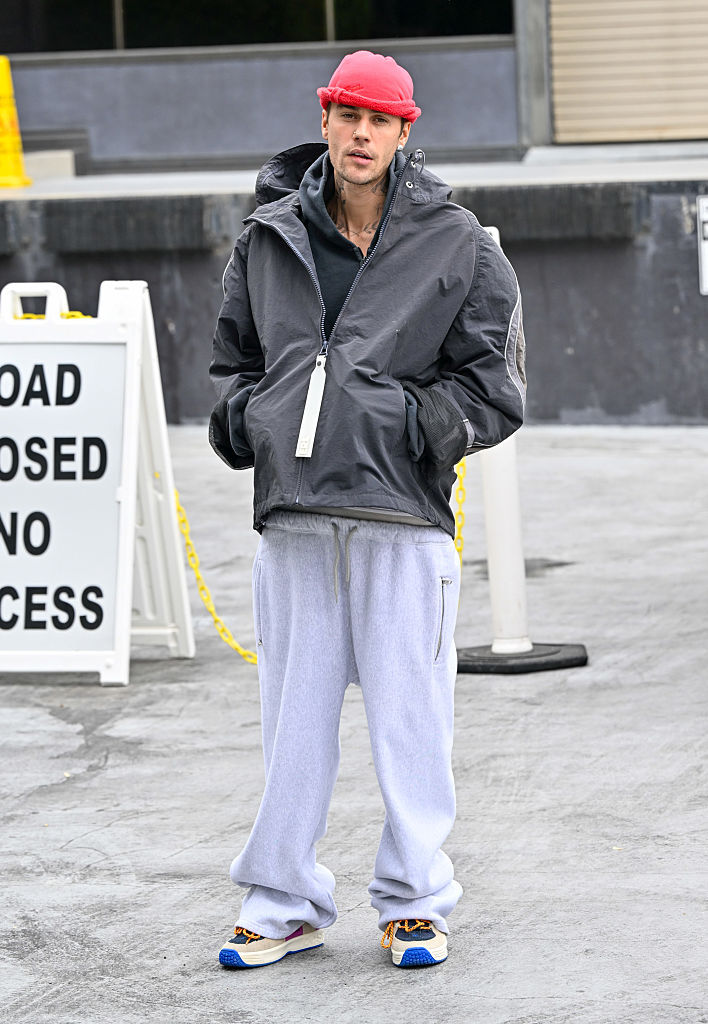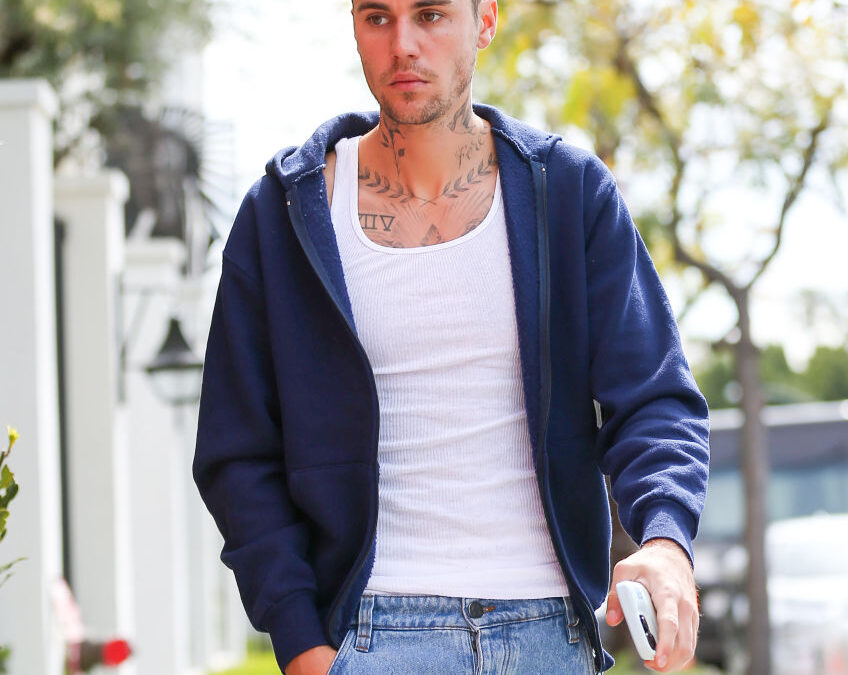Are we asking the right questions when it comes to Justin Bieber?
Rather than unpicking his behaviour, we should be listening to his words…
Words by Georgia Aspinall

The videos of Justin and Hailey Bieber at Coachella were endearing at first. They sang and danced arm in arm while watching Travis Scott, Yeat and Roddy Rich. Then came the clips that social media users have labelled ‘disturbing’, showing Justin shirtless and hunched over in the crowd, being physically supported by a friend as he danced, and later smoking what appeared to be marijuana next to his younger sibling, Jaxon, 15 – whom Hailey was then seen shepherding away.
It’s become part and parcel of the news cycle to see warnings about Justin’s behaviour. In September last year, after P Diddy was charged with sex trafficking (allegations he denies), fans began to unpick Bieber’s close relationship with the rapper during his early fame, jumping to harrowing conclusions which Justin has never commented on.
Instead, his sometimes-dishevelled public appearance has been scrutinised endlessly and former team members say he’s ‘disintegrating’. ‘He’s lost,’ one recently told The Hollywood Reporter. ‘There’s no one protecting him because there’s no one there willing to say no to him.’
In February, Justin’s representatives were forced to deny allegations of drug use, saying he’s in the best place in life, parenting his newborn son, Jack, and working on new music. ‘The past year has been very transformative for him,’ a rep said. ‘He ended several close friendships and business relationships that no longer served him.’

The latter is in reference to Justin’s longtime manager, Scooter Braun, who Justin severed ties with in June 2024. Braun discovered Justin aged 13 from a YouTube video Justin had posted singing a cover of Ne-Yo’s So Sick – he was catapulted to global fame within a year, after his debut single, One Time, peaked at 17 on Billboard’s Hot 100 chart. But at the same time, he began smoking cannabis and says he later started abusing alcohol, lean (a mixture of codeine cough syrup, soda and sweets) and MDMA, as well as taking pills like Xanax and psychedelic mushrooms.
‘People don’t know how serious it got,’ Bieber said on his YouTube series, The Dark Season. ‘My security were coming into the room at night to check my pulse… it was legitimately crazy scary.’ Bieber has publicly blamed the pressures of early fame on his drug dependency, telling Billboard in 2015, ‘I wouldn’t suggest being a child star. Look at the statistics on how many child stars have crumbled… It’s because it’s f-cked, this lifestyle.’
Justin’s right that studies show child stars are more likely to suffer with PTSD, anxiety and depression – and he’s not the only one to speak out. Alyson Stoner, who made her acting debut at eight on the Disney Channel, says she ‘narrowly survived the toddler-to-trainwreck-pipeline’. Jennette McCurdy, another Disney alumni, called child fame ‘a trap’ and Mara Wilson, who played Matilda aged nine, told The Guardian in 2023, ‘I don’t think you can be a child star without there being some kind of lasting damage.’
‘Recent research suggests that growing up as a child entertainer can count as an “adverse childhood experience”, which is typically defined as experiences of trauma or sexual abuse,’ explains Dr Audrey Tang. ‘For child stars, there’s a lack of safety and stability, increased stress and additional burdens from working in entertainment. ‘
‘I wouldn’t suggest being a child star.’
This all begs the question, should there be an ‘age restriction’ on fame? Of course, there will always be young actors and musicians working in the industry, but if we isolate entertainment from fame, there are changes that can be made. Stricter reporting restrictions could be introduced for those under 18. Studios and record labels could be required to offer adequate management and psychological support, as well as limiting contractual obligations around promotional tours for projects. While there may still be social media sleuths who document the lives of their favourite teen idol, tech giants could introduce stricter guidelines on content that pertains to celebrities who are still minors.
‘The industry has a responsibility to stop making excuses and understand there are real issues at stake here,’ adds Dr Tang. ‘Children need someone safeguarding them that they can trust, who doesn’t have an agenda outside of their emotional wellbeing – because that isn’t always the parent.’
As we sit and watch in horror while the same narrative, we’ve seen far too many times before plays out, it’s time to ask: when will we have seen enough to make a real change?
Photos: Getty

